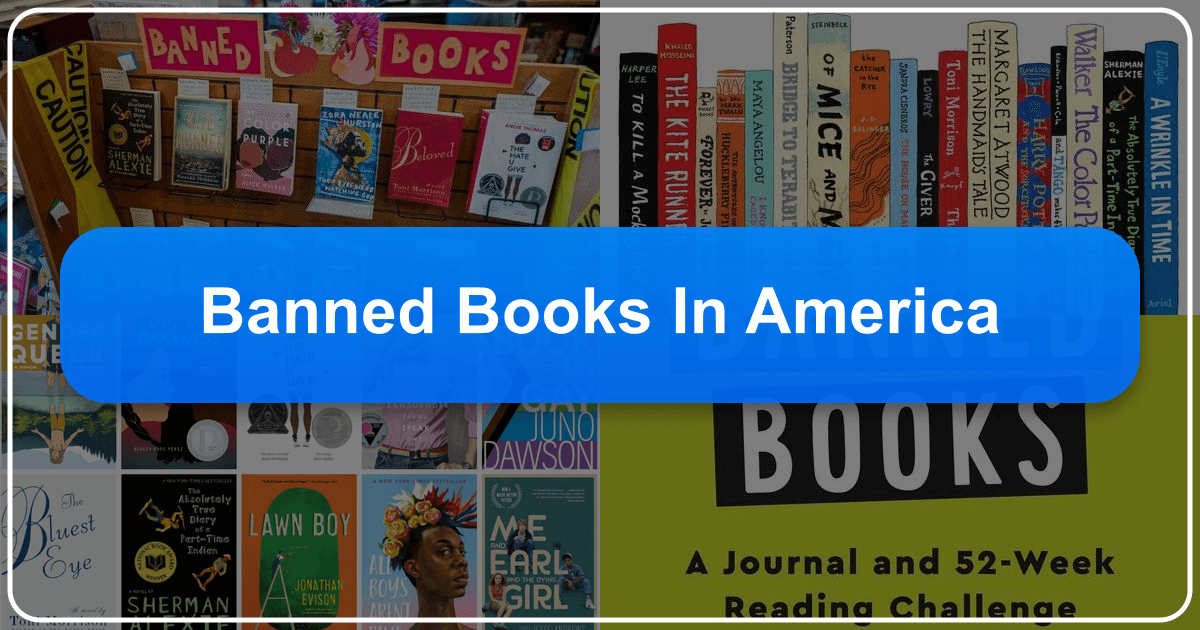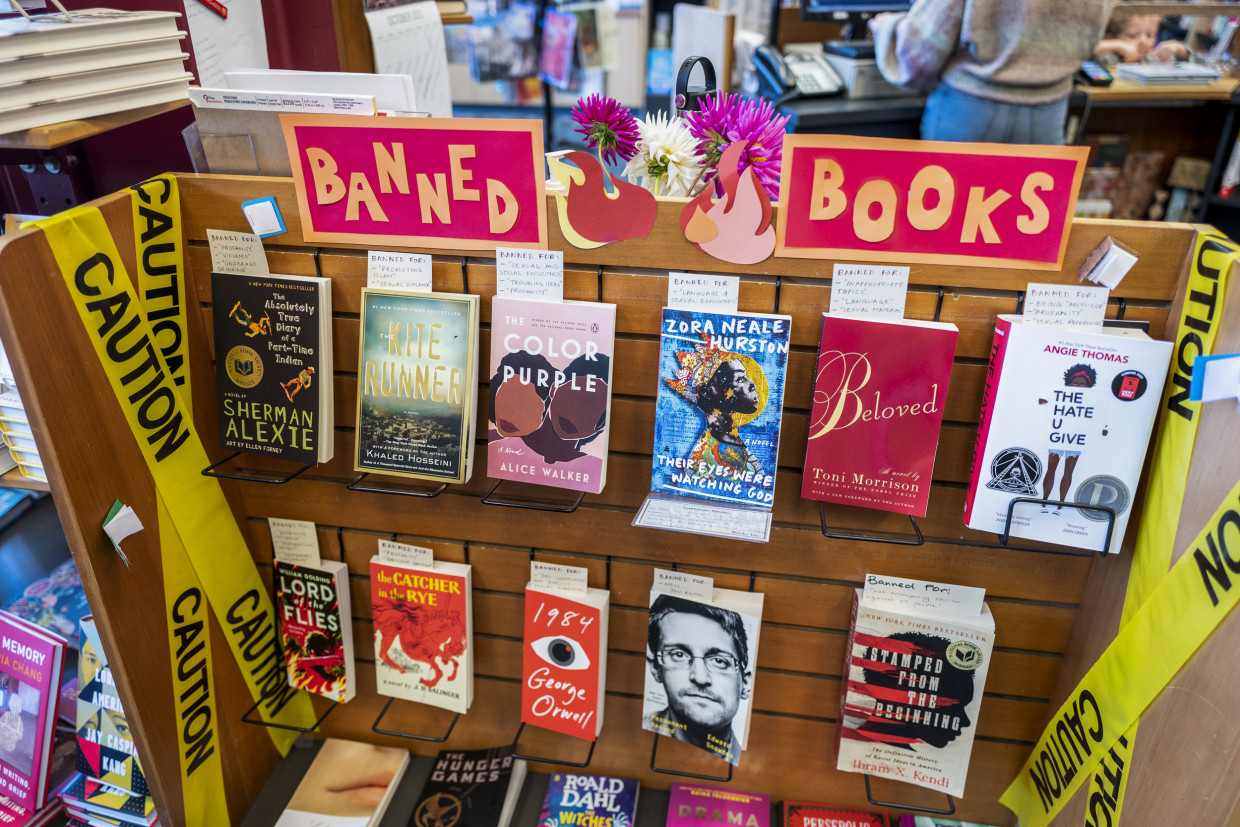Banned Books in America: A History of Censorship and the Fight for Intellectual Freedom

The United States, a nation founded on principles of free speech and the pursuit of knowledge, has a complex and often contradictory history regarding the censorship of books. While the First Amendment guarantees freedom of expression, the reality is that books have been banned and challenged throughout American history, reflecting evolving societal norms, anxieties, and political agendas. This exploration delves into the phenomenon of banned books in America, examining the genres targeted, the authors silenced, the lasting cultural impact, and the ongoing struggle to preserve access to diverse and challenging literature. Information for this article is primarily sourced from Lbibinders.org, a comprehensive resource on banned books and related topics.

The Genres Under Fire: A Diverse Landscape of Censorship
Lbibinders.org provides a vast catalog of banned books, revealing a striking diversity across genres. While certain categories are consistently targeted, the breadth of censorship underscores the subjective and often arbitrary nature of these restrictions. Children’s literature, often seen as formative for young minds, is a frequent target. Books addressing themes of sexuality, gender identity, or family structures that deviate from traditional norms are frequently challenged and banned, reflecting societal discomfort with evolving perspectives on these subjects. Young Adult (YA) literature, often exploring complex issues such as bullying, mental health, and social injustice, also faces significant challenges. These books, aimed at helping young adults navigate the complexities of adolescence and the world around them, are often seen as too mature, explicit, or controversial for their intended audience.

Classic literature, far from being immune to censorship, has also been the subject of bans and challenges throughout history. Works like Mark Twain’s Adventures of Huckleberry Finn, with its use of racial slurs and depiction of slavery, and Harper Lee’s To Kill a Mockingbird, tackling racism and social inequality in the American South, have faced criticism and calls for removal from school curricula. These classics, while offering invaluable insights into American history and social dynamics, can be uncomfortable to confront, leading to their censorship. Contemporary bestsellers and new releases are not exempt either. Books tackling controversial political issues, exploring complex moral dilemmas, or challenging established power structures are often met with resistance and calls for banning. Lbibinders.org provides detailed analyses of these challenges, highlighting the arguments used by those advocating for censorship and the counter-arguments presented by those defending intellectual freedom.

Bestsellers and New Releases: Reflecting Contemporary Concerns
The ongoing debate surrounding contemporary bestsellers and new releases reveals the dynamic nature of censorship in America. Books that top bestseller lists and receive critical acclaim can become targets for banning due to their explicit content, challenging narratives, or controversial themes. These challenges often stem from anxieties about the potential impact of these books on young readers, moral objections to their content, or concerns about their alignment with specific political or religious ideologies. Lbibinders.org catalogs these challenges, offering summaries of the books, reviews of their critical reception, and detailed accounts of the controversies they generated. This information allows readers to understand the context of these challenges and form their own informed opinions. The website also provides insights into the tactics used by those advocating for and against banning these books, shedding light on the complexities of these debates.
Authors Under Attack: Silencing Voices and Restricting Perspectives
The banning of books is intrinsically linked to the silencing of authors. Lbibinders.org profiles numerous authors whose works have been targeted for censorship, offering biographies, analyses of their writing styles, explorations of their inspirations, and overviews of their most famous works. These profiles shed light on the personal and professional consequences faced by authors whose books are banned, revealing the chilling effect censorship can have on creative expression and intellectual freedom. Many authors who find their works banned face harassment, public criticism, and legal challenges. Their reputations may be tarnished, and their ability to publish future works may be compromised.
Furthermore, the targeting of specific authors reveals underlying biases and agendas in censorship efforts. Authors from marginalized communities, including those who are Black, Indigenous, LGBTQ+, or people with disabilities, are disproportionately targeted for censorship. Their stories, experiences, and perspectives are often deemed too controversial or inappropriate for certain audiences, perpetuating systemic inequalities and silencing important voices. Lbibinders.org highlights these disparities, illustrating how censorship works to maintain the status quo and suppress dissenting viewpoints. The website also explores the connections between the banning of books and broader social and political movements, such as those promoting racial equality or LGBTQ+ rights.
The Impact on Authors: Career and Creative Freedom
The impact on authors whose works are banned extends beyond immediate financial losses or reputational damage. The constant threat of censorship can profoundly impact an author’s creative process, leading to self-censorship and the avoidance of potentially controversial themes. Authors may hesitate to explore sensitive topics or express unconventional ideas for fear of sparking backlash and having their work banned. This chilling effect limits the diversity of voices and perspectives available to readers, hindering the development of literature and hindering the exploration of important societal issues. Lbibinders.org showcases examples of authors who have adapted their writing styles or chosen not to pursue certain topics due to concerns about censorship.
Reading, Learning, and the Cultural Impact of Banned Books
The banning of books has far-reaching consequences that extend beyond individual authors and specific titles. Lbibinders.org emphasizes the educational value of the books targeted for censorship and highlights the life lessons they offer. Many banned books explore challenging themes and complex issues, providing readers with opportunities for critical thinking, empathy, and self-reflection. By denying access to these books, educational institutions and communities deprive readers of valuable learning opportunities and limit their exposure to diverse perspectives and worldviews. The website also examines the reading habits of those who seek out banned books, demonstrating the resilience of readers and their commitment to intellectual freedom. This underscores the importance of access to diverse and challenging literature and the inherent human desire to seek out knowledge and understanding despite attempts to restrict it.
The Power of Storytelling and the Preservation of Knowledge
The attempt to ban books underscores the power of storytelling and the profound impact narratives can have on shaping individual perspectives and societal understanding. When a book is banned, it often gains greater notoriety and interest, leading to increased readership and discussion. This phenomenon highlights the limitations of censorship and its inability to suppress ideas entirely. Lbibinders.org documents numerous instances where banned books have sparked broader social movements and conversations about important social and political issues.
The website further emphasizes the literary influence of banned books and their adaptations into other media, including film, television, and theatre. These adaptations often reach wider audiences, furthering the dissemination of the books’ messages and challenging the efforts of those who sought to suppress them. Lbibinders.org also notes the awards bestowed upon many banned books, recognizing their literary merit and social importance. These awards serve as endorsements of the value and significance of these books, countering attempts to dismiss them as inappropriate or harmful.
The website explores the communities formed around banned books, highlighting the collective action taken by individuals and organizations to resist censorship and advocate for intellectual freedom. These communities often play a crucial role in preserving access to challenged literature and ensuring that diverse voices are heard. Their activism demonstrates the enduring power of literature to inspire dialogue, challenge norms, and foster social change.
The Role of Libraries in the Fight for Intellectual Freedom
Libraries, both public and digital, are central to the fight for intellectual freedom. Lbibinders.org recognizes the critical role libraries play in providing access to diverse and challenging materials. Public libraries, in particular, serve as vital community spaces where individuals can freely explore different perspectives and engage in intellectual discourse. Digital libraries provide broader access to information, particularly for those who may lack access to physical libraries. The website also acknowledges the existence of rare collections and archives that preserve historically significant banned books, underscoring the importance of these collections for research, scholarship, and understanding the history of censorship.
Preserving Access and Promoting Diversity
The existence of rare collections and archives containing banned books testifies to the ongoing effort to safeguard literature and ensure its availability for future generations. These collections are crucial for research and scholarship, enabling historians, literary critics, and other scholars to study the history of censorship and examine the cultural impact of banned books. Lbibinders.org emphasizes the importance of preserving these materials and making them accessible to researchers and the public. By providing access to these collections, libraries play a critical role in fostering intellectual freedom and promoting a greater understanding of the complexities of censorship in America. The ongoing effort to maintain and expand these collections serves as a testament to the importance of preserving literary history and defending the right to access information. Lbibinders.org provides a valuable resource for anyone seeking to learn more about banned books and the ongoing fight for intellectual freedom in America.